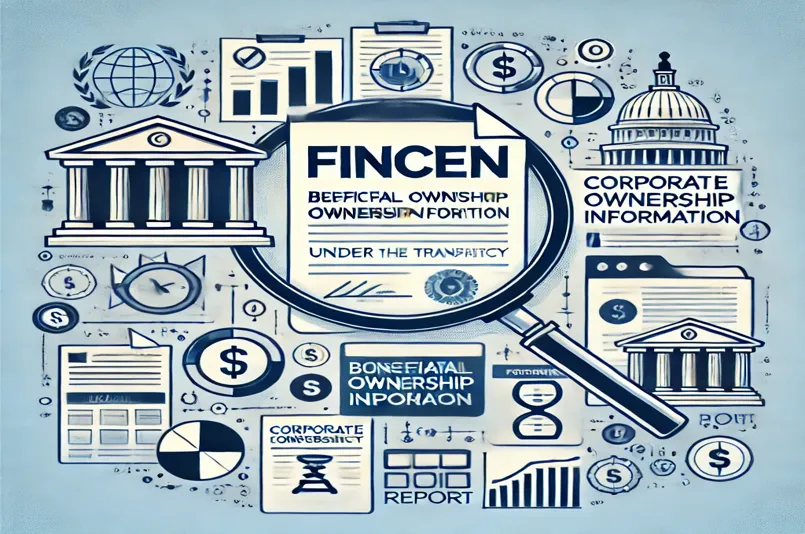Everything You Need to Know About the FinCEN BOI Report

FinCEN BOI Report: Understanding the Key Requirements
The Financial Crimes Enforcement Network (FinCEN) has mandated that certain entities disclose Beneficial Ownership Information (BOI) under the Corporate Transparency Act (CTA). This regulation, effective January 1, 2024, is designed to combat illicit activities like money laundering by increasing transparency in corporate structures.
BOI e-Filing Alert: Please note that beneficial ownership information reporting requirements have been affected by a recent federal court order. The Department of the Treasury is appealing that order. In the meantime, reporting companies are not currently required to file a BOIR and are not subject to liability if they fail to do so while the applicable order remains in force. However, reporting companies may still opt to file a BOIR.
Table of Contents
- Who Must Report?
- What Information Is Required?
- Deadlines for Reporting
- Differences Between FinCEN and Financial Institutions
- Penalties for Non-Compliance
- Who Can File on My Behalf?
- Want Us to File the FinCEN BOI Report on Your Behalf?
- Frequently Asked Questions (FAQs)
Who Must Report?
The BOI reporting requirement applies to two main categories:
- Domestic Entities: Corporations, LLCs, and other entities formed through a formal filing under state or tribal law.
- Foreign Entities: Businesses registered to operate in the U.S.
Certain entities are exempt, such as publicly traded companies, banks, and nonprofit organizations. A complete list of exempt entities can be found on the FinCEN BOI page.
What Information Is Required?
Entities must report information about:
Beneficial Owners
For each beneficial owner, the following information is required:
- Full name
- Date of birth
- Residential or business address
- Unique identifying number from a valid ID, such as a U.S. passport, driver’s license, or foreign passport
Company Applicants
These are individuals who file the formation documents for the entity. Required details include:
- Full name
- Residential or business address
- Unique ID number and issuing jurisdiction
Deadlines for Reporting
- Existing Entities (before January 1, 2024): File by January 1, 2025.
- New Entities in 2024: File within 90 days of creation or registration.
- New Entities (from January 1, 2025): File within 30 days of creation or registration.
- Updates and Corrections: Submit within 30 days of the change.
Differences Between FinCEN and Financial Institutions
Both FinCEN and financial institutions collect beneficial ownership information, but for different purposes:
- FinCEN: Collects information to aid law enforcement in combating illicit activities like money laundering.
- Financial Institutions: Collect information for customer due diligence (CDD) to ensure compliance with banking regulations.
For example, financial institutions collect Social Security numbers, while FinCEN does not. FinCEN focuses more on unique IDs, such as a passport number.
Penalties for Non-Compliance
Failing to report, filing incorrect information, or missing deadlines can result in severe penalties, including:
- Significant fines
- Imprisonment
It is critical to stay compliant to avoid these consequences.
Who Can File on My Behalf?
FinCEN allows the report to be filed by:
- Authorized Representatives: This can include legal counsel, accountants, or other professionals designated by the reporting entity.
- Service Providers: Specialized bookkeeping providers like Maxim Liberty can handle the filing process on behalf of the entity.
- In-House Compliance Teams: Companies with dedicated compliance departments can manage the process internally.
Regardless of who files, the entity remains responsible for the accuracy and completeness of the information submitted.
Want Us to File the FinCEN BOI Report on Your Behalf?
At Maxim Liberty, we understand the complexities of regulatory compliance. Our experts can file the FinCEN BOI report on your behalf, ensuring accuracy and timely submission.
Frequently Asked Questions (FAQs)
1. What is Beneficial Ownership Information (BOI)?
Beneficial Ownership Information refers to details about individuals who directly or indirectly own or control a reporting company. This includes individuals with substantial control over the company or those who own or control at least 25% of the ownership interests.
2. Why is BOI reporting required?
The BOI reporting requirement aims to enhance corporate transparency and combat illicit activities such as money laundering, terrorist financing, and other financial crimes by providing law enforcement with essential information about the individuals who own or control companies.
3. Are there any exemptions to the BOI reporting requirement?
Yes, certain entities are exempt from the BOI reporting requirement, including:
- Publicly traded companies
- Banks
- Credit unions
- Investment companies
- Insurance companies
- Charitable organizations
4. How can I submit the BOI report?
The BOI report must be submitted electronically through FinCEN’s secure filing system. Detailed instructions and resources are available on FinCEN’s BOI E-Filing System website.
5. What are the consequences of failing to comply with the BOI reporting requirements?
Non-compliance with the BOI reporting requirements can result in significant penalties, including fines and imprisonment. It is crucial for entities to understand their obligations and adhere to the reporting deadlines to avoid these consequences.
Maxim Liberty has been providing outsourced bookkeeping services to businesses and accounting firms in the USA and Canada since 2005.
